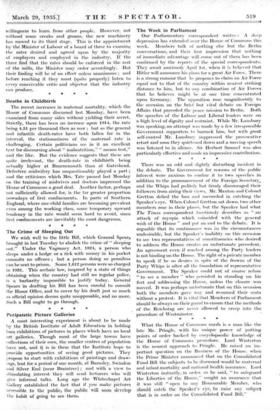There was an odd and slightly disturbing incident in the
debate. The Government for reasons of the public interest were anxious to confine it to two speeches in addition to the pronouncement of the Foreign Secretary, and the Whips had politely but firmly discouraged their followers from airing their views. Mr. Max-ton and Colonel Gretton defied the ban and succeeded in . catching the Speaker's eye. When Colonel Gretton sat down, two other members rose in their places, but the Speaker had what The Times correspondent facetiously describes as " an attack of myopia which coincided with the general wish of the House " and put an end to the debate. It is arguable that its continuance was in the circumstances undesirable, but the Speaker's inability on this occasion to see two representatives of constituencies who desired to address the House creates an unfortunate precedent. An agreement even if reached among the Party leaders is not binding on the House. The right of a private member to speak if he so desires in spite of the frowns of the Party Whips is after all the foundation of representative Government. The Speaker could not of course refuse " to see a member " who persisted in standing on his feet and addressing the House, unless the closure was moved. It was perhaps unfortunate that on this occasion both the members gave way and resumed their seats without a protest. It is vital that Members of Parliament should be always on their guard to ensure that the methods of the Reichstag are never allowed to creep into the procedure of Westminster.
* * *






































 Previous page
Previous page